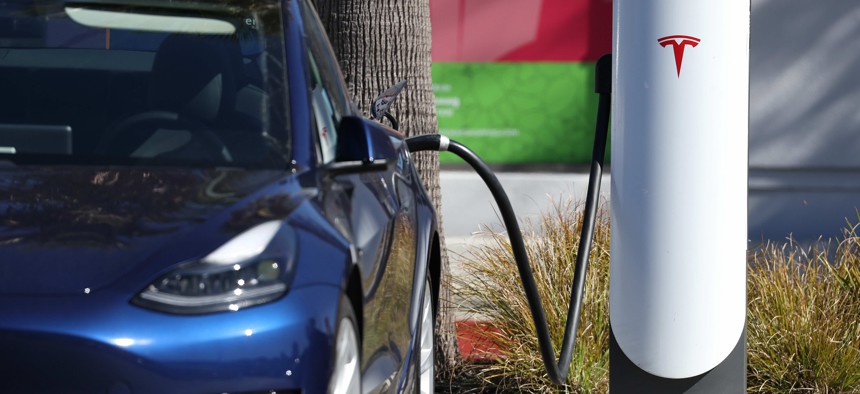
The Federal Highway Administration posted a request for information calling for details about how automakers will adopt Tesla-style plugs and chargers in an electric vehicle infrastructure. Justin Sullivan/Getty Images
Biden administration explores using Tesla-style tech in federally funded EV chargers
Most automakers have announced plans to use the industry leader’s standards, which would give them access to Tesla’s Supercharger network.
The Biden administration is looking for input on whether and how to incorporate Tesla-style chargers into its program for building an electric vehicle charging network throughout the country.
The move comes as Tesla opened up its proprietary “Supercharger” technologies to its competitors, and a national engineering group formalized the standard. Most major automakers—including Audi, BMW, Ford, General Motors, Honda, Hyundai, Mercedes-Benz, Nissan, Rivian, Stellantis, Toyota, Volkswagen and Volvo—have said they would start using the standard this year or next.
The Federal Highway Administration published a request for information Wednesday that asks for more details about how quickly other automakers will adopt the Tesla-style plugs and chargers, about the technical capacities of the new chargers, and whether it’s feasible for charging stations to accommodate both the Tesla-style chargers and chargers that use previously approved industry standards.
“As EV charging technology continues to rapidly evolve, we want to ensure our federal standards for EV charging keep pace with private sector innovation, adapt to a quickly evolving industry and meet the needs of EV drivers,” said FHWA Administrator Shailen Bhatt in a statement. “This RFI will help us gather important feedback from our federal, state, local and private partners to inform potential updates to our federal standards with those goals in mind.”
States are using money from the National Electric Vehicle Infrastructure program, which was part of the 2021 federal infrastructure package, to build out the network.
Several states—including Kentucky, Texas and Washington—have already raised the prospect that they would require federally funded charging stations to include Tesla-compatible chargers. But the FHWA requires that each of those charging sites must have four chargers with a Combined Charging System connector, an industry standard for plugs capable of fast charging. That helps ensure the public chargers don’t favor one company over another. The Tesla-type chargers would have to be in addition to those connections.
Tesla still dominates the EV industry in the U.S., both in the number of vehicles sold and in the number of charging stations. But Tesla opened its network to other automakers in 2023 so that federal funds to build chargers could be used to construct Tesla-compatible chargers.
The Biden administration encouraged an engineering group to quickly approve a standard that would allow other manufacturers to use the Tesla-style chargers. SAE International, the engineering group, did so in December, designating the Tesla-style chargers as the J3400 standard.
The Biden administration “facilitated industry collaboration that led SAE, automakers and the EV charging industry to move at an unprecedented pace to establish an open standard for the J3400 connector,” said Gabe Klein, executive director of the Joint Office of Energy and Transportation. “Now, this RFI seeks input from stakeholders regarding how to incorporate this innovation into our national charging network.”
Daniel C. Vock is a senior reporter for Route Fifty based in Washington, D.C.
NEXT STORY: Key federal workforce agencies get confirmed leaders







